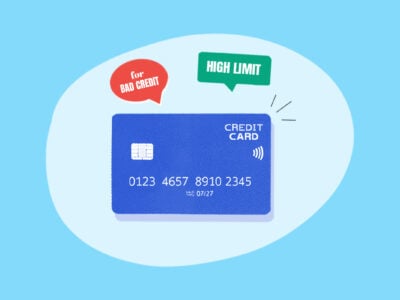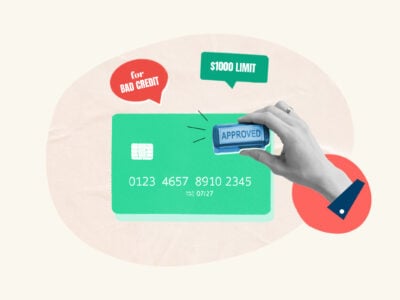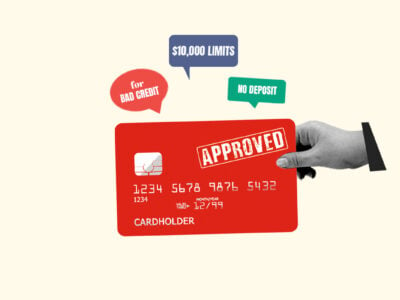Not all credit cards are built the same. Not only do their fees, rates, and terms vary, but the amount of money you can spend on them also depends on what card you have.
Every credit card comes with a credit limit—how much money can be charged to the card. Read on to learn how credit limits are determined, why they’re important, and what happens when you exceed the limit on your card.
Table of Contents
What’s a credit limit on a credit card and how does it work?
A credit limit on a credit card is the maximum amount you can spend on that card at one time. For example, if you have a $3,000 credit limit, you can make $3,000 worth of purchases on that card.
If your balance on your card reaches your credit limit, you can’t use your card anymore until you pay at least some of your balance off. This is one of the fundamentals of how credit cards work.
What’s the difference between your credit limit and available credit?
There’s a difference between your credit limit and your available credit. Your credit limit is the maximum balance you can incur on your card, whereas your available credit is the amount of credit that you can use right now.
In other words, your available credit is your credit limit minus:
- Your current balance
- Additional fees
- Pending charges
- Interest charges
As you pay off your credit card balance, your available credit will climb back up towards your credit limit, and you’ll have more money on the card to spend.
Credit limit vs. available credit: example
Say you have a $1,000 credit limit, but have made $100 in purchases. Your available credit is now $900. Once you pay back that $100, your available credit will be the same as your credit limit—it will also be $1,000.
How is your credit limit determined?
Your credit limit is determined by a number of factors, and may change over time. The credit limit you’re offered when you first qualify for a new credit card is called your initial credit limit.
Your initial credit limit is determined by a variety of factors (although each credit card issuer has their own way of determining a card’s credit limit), most commonly including your:
- Credit score
- Credit history (especially your payment history)
- Employment status
- Income
- Debt-to-income ratio
- Security deposit*
*If you have a secured credit card, your security deposit is usually equal to your initial credit limit.
After a certain amount of time using the card, you may automatically qualify for a credit limit increase. You might also be able to request a credit limit increase from your card issuer.
Credit limit increases are dependent on responsible card use, so make sure you always pay your credit card bill on time if you hope to get more credit in the future.
How to check your credit card limit
You can find your credit card limit on your:
- Monthly statement
- Initial credit card offer
- Credit card’s online account
- Credit card management app
Your credit limit will likely be stated alongside your current balance and your available credit.
If you’re unable to find your credit limit or think there’s a mistake in the amount listed, contact customer service by calling the number on the back of your credit card.
How your credit limit affects your credit score
Your credit limit affects your credit score by determining your credit utilization ratio.
Your credit utilization ratio is the amount of credit you’re currently using compared to how much credit you have. It’s calculated by dividing your current balance across all credit cards by your total credit limit across all cards (i.e., all your credit limits added together).
Your credit utilization ratio is a big contributing factor to your credit score, and a lower ratio (expressed as a percentage) is better for your score. Experts recommend you keep this number below 30%. Borrowers with excellent credit scores usually have rates closer to 10% and below. 2 3
Because of how credit utilization is calculated, having a higher credit limit can lead to a lower utilization rate. This, in turn, means that having a higher credit limit can directly benefit your credit score. How much credit you should have will depend on how responsibly you can use that credit, though, as having more credit but still having high balances will result in a high credit utilization rate.
Can you go over your credit card limit?
Yes, you can go over your credit card limit. However, most credit cards require you to opt into something called “over-limit protection” to be able to spend over your credit limit. Otherwise, your over-limit transaction is likely to get your credit card declined.
While enabling over-limit protection allows you to spend beyond your credit limit, it still comes with consequences.
What happens if you go over your credit limit
If you overcharge a credit card by spending over your credit limit, you may have to deal with the following consequences:
- Over-limit fees or fines
- Your credit card issuer lowering your credit limit
- Penalty APR (i.e., you’ll pay a higher interest rate on the transaction)
- Account closure
- Card suspension
- A drop in your credit score
How spending over your credit limit will affect your credit card depends on your credit card issuer, your borrowing history, and your credit card’s terms. No matter what, overcharging is dangerous to your credit and your finances, and should be avoided at all costs.






